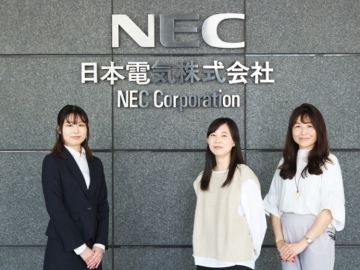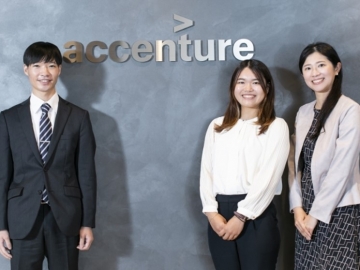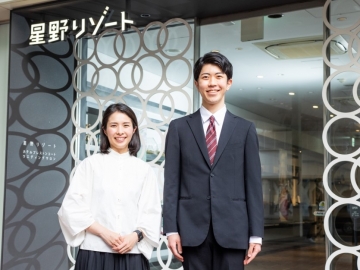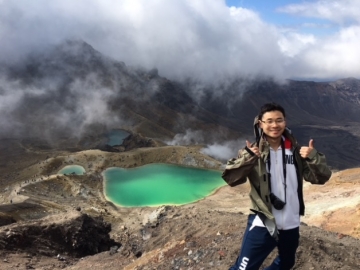How should international students approach job-hunting in Japan?

The global team at the Career Center
The way to approach job-hunting for international students in Japan is the same as any other Japanese students would. The key point here is to get used to the Japanese style of recruitment practices.
At present, there are over 200,000 international students studying in Japan and the number of students who wish to find employment in Japan has been rising every year. What Japanese companies are looking for are quality international students who not only possess the same caliber as Japanese students, but also students who can serve as the bridge between Japan and their native countries. They are also looking for international students who can contribute internally to the companies. Additionally, international students should also have an excellent command of the Japanese language i.e. passed N1 or N2 level in the Japanese-Language Proficiency Test (JLPT), possess outstanding English skills for business communication, as well as displaying good understanding of the Japanese culture and their way of thinking.
Japanese language skills is a must for doing job-hunting related research
Being clear about one’s own strengths and weakness, i.e. having the ability to do a thorough self-evaluation is extremely important for job-hunting in Japan. Students should also do proper research and learn about the industries and companies they want to work in. In order to do so, having a good command of Japanese language is mandatory. Here are some ways students can go about doing research:
- Make use of printed materials: company broaches, books with information on various industries, business magazines, newspapers etc.
- Look up information on the internet: recruitment information on My Waseda, homepages of companies, recruitment websites, digital journal etc.
- Meet employee in person: attend job seminars organized by companies, make appointment and interview Waseda University alumni working in the companies you are interested in etc.
 Although there might be exceptions depending on the company, the job-hunting period for international students is essentially the same as Japanese students. To be sure, check the recruitment information of each company you wish to apply to. As you are making preparation for job hunting (e.g. attending job seminars, submitting entry sheets, writing resumes, practicing **SPI examination questions etc.), it is advisable to ask for objective feedback from the staff at the Career Center, your family members or friends etc.
Although there might be exceptions depending on the company, the job-hunting period for international students is essentially the same as Japanese students. To be sure, check the recruitment information of each company you wish to apply to. As you are making preparation for job hunting (e.g. attending job seminars, submitting entry sheets, writing resumes, practicing **SPI examination questions etc.), it is advisable to ask for objective feedback from the staff at the Career Center, your family members or friends etc.
What most international students find most challenging during job-hunting is doing group discussion in Japanese with native Japanese students. Unfortunately, there is no easy way out. The only way to make the best out of this unfavorable situation is to practice and get used to it. If you need additional help, it is recommended that you visit the Career Center as it provides various support and guidance to international students such as conducting courses on how to write your resumes or strategies to deal with group discussions. As Japanese students also frequently sign up for these courses with Career Center, it will be good practice for group discussion if you sign up for the open-to-all group discussion practice courses.
**Some companies allow international students to opt for the SPI Global test conducted in either English, Chinese or Korean.
Extending length of stay at the Immigration Office for job-hunting
If you are thinking of staying in Japan for job-hunting after you graduate from the University, remember to change your residence status from “Student” to “Designated Activities” at the Immigration Office to extend your stay in Japan. In principle, you will be given an extension of six months but it is possible to apply for a second extension (maximum number of extensions: 2; up to one year in length). For more details, visit the websites of Career Center and Ministry of Justices.
- Career Center Website (extension of stay in Japan for job-hunting after graduation)
- Immigration of Bureau of Japan Website
The whole job-hunting process in Japan can be long and complex, and writing entry sheet as well as preparing for job-hunting examination and interview are definitely not easy. Be sure to have a clear vision of what you want to do for the next five or 10 years, as well as what you hope to achieve and be in the future. If you have any questions or concerns, remember to get help from the Career Center (there are also English speaking staff at the Center).
International student shares her job-hunting experience in Japan
 Yang Guang graduated from of the Graduate School of Economics in March 2017.
Yang Guang graduated from of the Graduate School of Economics in March 2017.
She will be joining a company in manufacturing industry.
1. Why did you decide to work in Japan?
When I was in my first year at graduate school, many of friends were doing internships and doing preparation for job-hunting. I was not sure if I could get a job in Japan, but looking at how motivated my friends were, I decided to give it a try myself.
2. When did you start and end your job-hunting?
I started my job-hunting in October 2015 and it ended in May 2016. I signed up for various internship programs and started writing my entry sheet during my first year in graduate school.
3. What kind of industries or organizations were you interested?
I focused mainly on IT consulting firms but also took interests in manufacturing and finance industries. Most of them were big Japanese companies. In March 2016, I attended a company briefing session conducted on Campus and was handed a list of companies who are actively recruiting international students. From this point, I decided to send my application only to such companies.
4. How did you go about doing your job-hunting?
In total, I attended about 100 company briefing sessions (including those conducted on Campus). The numbers of companies I sent my entry sheet to and made it to the interview round were 40 and 20 respectively. The experiences I got from joining seminars and panel discussions conducted employees of various organizations were of great. You get to better understand the strengths of the companies by joining such events. By sitting in the Q&A session, you can also get a sense of the working environment and atmosphere of the company.
Many companies will require you to do the SPI test. The way I go about tacking it is to keep practicing practice questions. If you repeat the process and practice the same questions over and over again, you will eventually gain speed and get better at it.
5. What challenges did you face?
I was really bad at group discussion. You have to discuss, and sometimes debate, in Japanese with native Japanese students. I think the panels and observers are looking out for international students who can provide immediate responds and are capable of articulating their ideas clearly in Japanese. If you have trouble understanding you members during group discussion, the panels may think that you are not listening to your members. If you do not voice out your opinions, the panels may think that you are not contributing to your group. As such, having a high level of Japanese language proficiency and making constructive contribution to your group during group discussion are extremely important.
6. Tell us more about the importance of Japanese language for job-hunting in Japan.
During group discussion, you will be expected to possess Japanese language skills equivalent to or better than JLPT N1 standard. In fact, many big companies expect you to have native Japanese language comprehension skills. It is alright if you have a slight accent, but you have to be able to communicate smoothly in Japanese.
7. Do you have any advices for your juniors who intend to work in Japan?
There are three pieces of advice I would like to give. There are: prepare early, see and check information etc for yourself, and treat self-evaluation seriously. It is especially important to do a thorough self-evaluation as you will be required to explain what kind of person you are and how you can contribute in order to convince companies to hire you. Additionally, it is also important to be original when you give examples to illustrate your personality etc.







